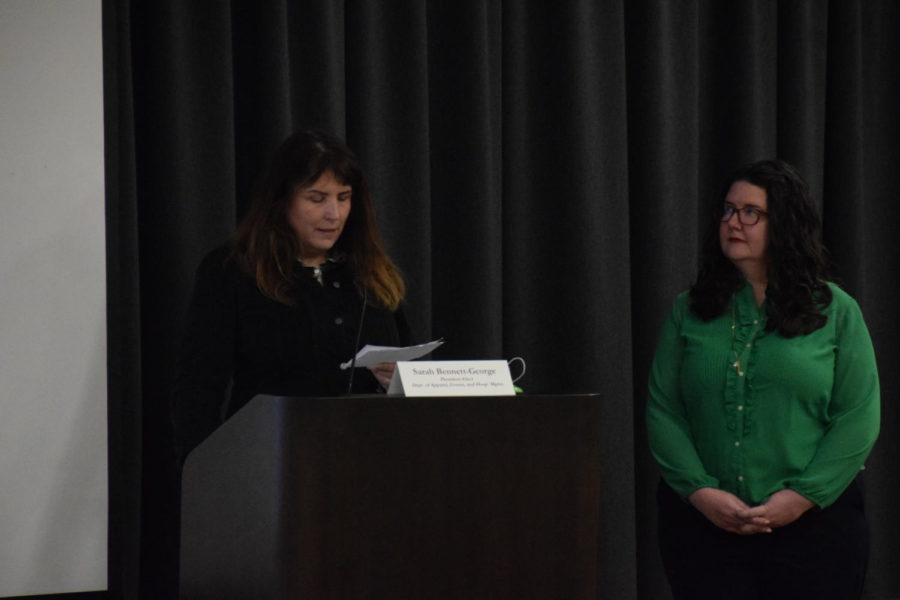Faculty Senate wraps up the 2022-23 school year
The Faculty Senate Past president, Andrea Wheeler, pictured before passing over the gavel to President-Elect, Sarah Bennett-George.
Iowa State’s Faculty Senate seated the new president and senators during its last meeting of the 2022-23 academic year, Tuesday afternoon.
The senate recognized the 19 retiring senators before the past president of the Faculty Senate, Andrea Wheeler, conducted the passing of the gavel to the new president, Sarah Bennett-George, signifying the beginning of her term.
“I’m proud to pass this gavel to the new Faculty Senate president, Sarah Bennett-George,” Wheeler said. “It has been an honor to work with Sarah over the past few years on the Faculty Senate executive board and in her role as president-elect, and as chair of the Academic Affairs Council.”
Bennett-George then led the senate in the seating of the new senators.
“To personally welcome you to the senate and express how much I look forward to working with you all over the coming year,” Bennett-George said.
Vice President and Provost Jonathan Wickert gave the annual presentation on faculty advancement at Iowa State. Wickert said out of the 80 cases of faculty applying for tenure that made their way to the institutional decision, 75 were approved.
Wickert said the 94% approval rate of cases brought to the institutional level was roughly on par with the previous two years, 97% and 96%.
For term faculty, Wickert said the university saw 37 cases of term faculty applying for advancement, all of which were successful. He said 27 of these cases were assistant teaching professors advancing to associate teaching professor or the position of full teaching professor.
“I’m particularly pleased to hear that about a third of these cases represent advancement to the rank of Professor on the term faculty track,” Wickert said. “I’m delighted to see that it’s important for us to advance faculty at all levels and all offerings.”
The senate heard the first reading of a policy to create waitlists for students interested in enrolling in full courses. The previous Academic Affairs chair and new president-elect, Rahul Parsa, said the policy would take effect in spring 2024 as students begin registering for classes using Workday Student.
Annemarie Butler, associate professor in philosophy and religious studies, voiced concern that having a waitlist function on a first-come, first-served basis may make enrollment more difficult for students who need certain courses to graduate.
Terri Boylston, associate professor in food science and human nutrition, addressed the question and said there are workarounds for students who are in a position where they need a certain course to graduate.
“I have to say, my understanding is currently, there are those workarounds within each college; the individual that has the ability to put students into classes when they’re in that situation that will affect their graduation rate that is still going to be in play,” Boylston said.
The senate also heard the first reading of a policy to change scholastic recognition for students who excel in academic work.
Currently, the students with a cumulative GPA in the top 2% of their class within their college are recognized with a congratulatory letter from the president and a notation of the accomplishment on the student’s permanent record.
The new policy would include the issuance of a president’s list every semester, made up of students who have completed 24 credit hours with a 4.0 GPA in their previous two semesters.
Your donation will support the student journalists of the Iowa State Daily. Your contribution will allow us to purchase equipment, send our student journalists to conferences and off-set their cost of living so they can continue to do best-in-the-nation work at the Iowa State Daily.













